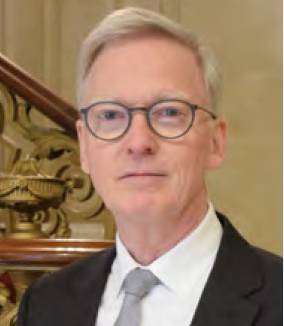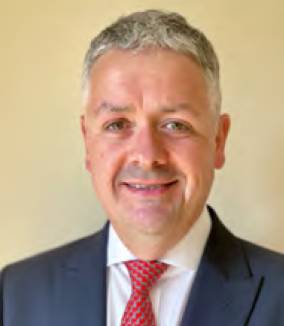Message from RAeS
Message from RAeS
 Marking an historical moment for the UK, 27 September 2021 saw publication of the long-awaited UK National Space Strategy1. No longer seeking to increase the UK share of the global space market to 10% by 2030, the strategic objective is now to ‘put the UK firmly in the front rank of the global space industry’, and to establish the right conditions to achieve the UK’s civil and defence ambitions in space by unlocking growth in the space sector, collaborating internationally, growing the UK as a science and technology superpower and developing resilient space capabilities and services.
Marking an historical moment for the UK, 27 September 2021 saw publication of the long-awaited UK National Space Strategy1. No longer seeking to increase the UK share of the global space market to 10% by 2030, the strategic objective is now to ‘put the UK firmly in the front rank of the global space industry’, and to establish the right conditions to achieve the UK’s civil and defence ambitions in space by unlocking growth in the space sector, collaborating internationally, growing the UK as a science and technology superpower and developing resilient space capabilities and services.
Publication not only coincided with the start of the three-day online 2021 UK Space Conference, which I personally attended, giving little time for conference delegates to deeply analyse the strategy and its implications but was only four days ahead of the deadline for submissions to the Comprehensive Spending Review (CSR).
Interestingly, and without advance knowledge of the date of publication of the strategy, a Westminster Forum Seminar entitled ‘Priorities for the UK space sector’ was scheduled for 14 October. I was asked to speak specifically on the ‘alignment of funding and investment with the strategic goals for the sector’, very pertinent given the circumstances. In line with the Society submission to the CSR on 30 September2, my message was that a significant increase in government funding will be required, given the fact that the UK lies around tenth in the global list of space nations (based on 2018 data) with 2.7% of NASA spending and 20% of French spending and given the fact that UK’s academic and industrial reputation and experience has essentially been built up over more than 40 years through the UK’s engagement as the fourth largest contributor3 to (and with guaranteed return from) the European Space Agency and that private investment is supportive but cannot take the place of government funding. However, given the schedule constraints, it is likely that government funding will be defined by the end of 2021 before any in-depth analysis of the options for implementation of the strategy has been conducted.
On a lighter note, regarding our engagement with young people, on 17 September I was pleased to contribute online to the RAeS Young Persons Conference 2021 ‘Next-Generation Opportunities in Space’, encouraging people to enter the space domain, at all levels, and across all areas of expertise. On 5 October, the Society Space Group Early Careers Sub-Committee with Lockheed Martin UK ran a National Spaceport Competition, a student competition to promote spaceflight and inspire the next generation, involving over 1,500 students from more than 30 schools across the country. The students developed designs for a future national spaceport making critical design decisions and trade-off important factors, such as environmental impact, performance, safety, security and cost. Over the next month, the entries will be judged for awards and prizes for their school and next year the Society hopes to rerun the event on an even larger scale, reaching tens of thousands of young minds.
The 2021 Branches Conference took place on 8/9 October, and I gave a brief (online) introduction. I highlighted the excellent work of the Branches in fulfilling the Society mission, through their numerous high-quality online events, and stressed the importance of our collective attention to diversity and inclusion, women in aerospace, aviation and space and, of course, engaging with young people in their regions. In addition, my thanks went to the Coventry Branch for hosting the conference, to Meggitt who had permitted a visit to their establishment, and to the Branches Committee for their continuous support to all the Branches. Simon Hall, Chair of the Branches Committee was unfortunately not available but the Vice-Chair, Hania Mohiuddin did an excellent job in chairing the event.
I was interested to learn of the apprehension towards space tourism expressed by the UN Secretary-General António Guterres at the UN General Assembly on 27 September, concerning the ethical aspects, as the number of space tourism missions scheduled increases over the next five years. Regarding the protection of our near-space environment, Space Forge, a UK start-up established in 2018 developing ecofriendly reusable satellites, has been awarded a contract under the ESA Boost! Initiative, to support technology development for its ForgeStar Orbital Vehicle (FSOV-1), scheduled for launch in 2022 and serving as an active field test for return-to-Earth reusable satellites and tracking software.
Finally, I look forward to meeting the winners at the Society Medals and Awards Night on 22 November in Hamilton Place.
1 https://www.gov.uk/government/publications/national-space-strategy
2 https://www.aerosociety.com/media/16983/2021-raes-csr-submission-final.pdf
3 https://www.statista.com/statistics/1169442/esabudget-contributors-europe
 As I write, COP26 in Glasgow is about to begin, and the world’s focus once again returns to sustainability and, undoubtedly, how aviation and aerospace are working to reduce our impact on the environment around us. Our Climate Change conference, which took place on 19-20 October and addressed a number of challenges, was very well attended and saw us take our first steps into the next stage of our pandemic recovery as a hybrid event, with a blend of online and physical attendance.
As I write, COP26 in Glasgow is about to begin, and the world’s focus once again returns to sustainability and, undoubtedly, how aviation and aerospace are working to reduce our impact on the environment around us. Our Climate Change conference, which took place on 19-20 October and addressed a number of challenges, was very well attended and saw us take our first steps into the next stage of our pandemic recovery as a hybrid event, with a blend of online and physical attendance.